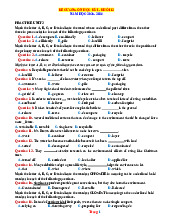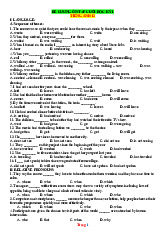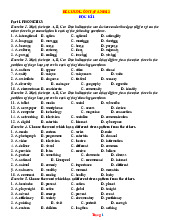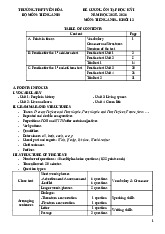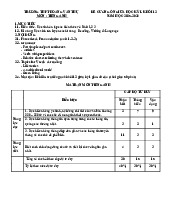









Preview text:
ĐỀ CƯƠNG ÔN TẬP KIỂM TRA CUỐI KÌ 1 - NĂM HỌC 2022-2023 TIẾNG ANH LỚP 12 I. PRONUNCIATION
1. Mark the letter A, B, C or D on your answer sheet to indicate the word that differs from the others in the position of primary stress
1. A. distributed B. used C. emailed D. copied 2. A. invented B. contributed C. attributed D. welcomed 3. A. coughed B. developed C. introduced
D. downloaded 4. A. wicked B. reduced C. influenced D. expressed 5. A. accessed B. searched C. surfed D. recorded 6. A. international B. nation C. national D. nationality 7. A. language B. massage C. marriage D. shortage 8. A. because B. nurse C. horse D. purpose 9. A. cultures B. customs C. ideas D. migrants 10. A. life B. like C. live D. lively 11. A. beard B. hear C. rear D. swear 12. A. ancient B. educate C. stranger D. transfer 13. A. account B. astound C. country D. mounting 14. A.magazine B. device C.opportunity D.progressive 15. A. dedication B. distinguished C. determine D. slightly
16. A. resources B. stages C. preserves D. focuses 17. A. adult B. husband C. mutual D. culture 18. A. asthma B. attitude C. habitat D. achievement
2. Mark the letter A, B, C or D to indicate the word that differs from the other three in the position of the
primary stress in each of the following questions. 1. A. emigrate B. immigrate C. advocate D. inhabit 2. A. confide B. comfort C. inflate D. severe 3. A. biology B. environment C. geography D. scientific 4. A. estimate B. prestigious C. proportion D. urbanity 5. A. drawback B. greenhouse C. mindset D. overload 6. A. tablet B. media C. social D. subscribe 7. A. newspaper B. smartphone C. access D. device 8. A. computer B. technology C. magazine D. connection 9. A. networking B. television C. socialize D. communication 10. A. digital B. entertain C. Internet D. Cyberspace 11. A. anthem B. appear C. attire D. attend 12. A. unify B. unique C. uniqueness D. unite 13. A. assimilate B. diagnose C. festival D. scenery 14. A. diversity B. endanger C. geography D. opposite
15. A. circumstance B. considerate C. community D. identity 16. A. traditional B. professional C impossible D. decoration
17.A. attract B. decide C. reject D. beauty 18.A. interfere B. memory C. personal D. vertical II. VOCABULARY: 1. Vocabulary
Mark the letter A, B, C or D on your answer sheet to indicate the correct answer
1. The Vietnamese people still follow the ………… of giving lucky money to children during the Tet holiday. A. costume B. custom C. assimilation D. practice
2. The ao dai, cheongsam, kimono, and sari are women’s national ………… in some Asian countries. A. culture B. values C. costumes D. customs
3. Teenagers can become addicted to ………… if they can’t control the time they spend online. A. cyber bullying B. instant messaging C. social networking D. technology
4. Most people rely heavily on ………… as their main source of information. A. the mass media B. leaflets C. advertisements D. blogs
5. A …………is an official document that you receive when you have completed a course of study or training. A. vocation B. subject C. certificate D. grade
6. The government hopes to …………its plans for introducing cable TV. A. carry on B. turn out C. go out D. get on
7. The mass media are means of …………, such as books, newspapers, recordings, radio, movies, television,
mobile phones and the Internet. A. advent B. communication C. technology D. information
8. People living in a ………… society should learn to respect and understand different cultural values. A. multinational B. traditional C. cultural D. multicultural
9. A survey was conducted to determine students’ ………… toward their purposes of studying. A. marriages B. attitudes C. counterparts D. appearances
10. A/an ………… is someone who always believes that good things will happen. A. pessimist B. optimistic C. optimist D. pessimistic
11. After a few decades of the economic reforms, Vietnam has increased the living ………… of people. A. surfaces B. standards C. levels D. backgrounds
12. You should keep your room free from ………… as they can cause serious health problems. A. mould and mildew B. asthma C. clutter D. disorder
13. Some people still think that our natural resources can never be ………… A. provided B. preserved C. used D. depleted
14. The principal of our school is a highly ………… man. A. disposable B. respectable C. reusable D. renewable
15. Students can easily ………… their short-term memory with unnecessary information. A. damage B. focus C. overload D. put off
16. Each form of mass media has an important impact on society. The underlined word is CLOSEST in meaning to ………… A. influence B. pressure C. affection D. role
17. Many ethnic groups find it difficult to maintain their own language.
The underlined word is CLOSEST in meaning to ………… A. continue B. assimilate C. speak D. preserve
18. In 150 B.C. the Greek astronomer Hipparchus developed a system to classify stars according to brightness.
The underlined word is CLOSEST in meaning to ………… A. record B. shine C. diversify D. categorize
19. It makes us aware of our global responsibilities.
The underlined word is OPPOSITE in meaning to ………… A. universal B. worldly C. national D. overall
20. She had a cozy little apartment in Boston. The underlined word is OPPOSITE in meaning to ………… A. uncomfortable B. warm C. lazy D. dirty
21. Rachel is neither nervous nor afraid- not, at least, of anything around her.
The underlined word is OPPOSITE in meaning to ………… A. troubled B. scared C. impatient D. unworried 2. Prepositions
Mark the letter A, B, C or D on your answer sheet to indicate the correct answer
1. Students use the library's computers to get access....the Internet. A. for B. to C. with D. by
2. Watch....for words like "so-called” in articles as they express the writer's bias. A. about B. out C. around D. over
3.Many parents afraid that their children are becoming less familiar....their traditions. A. to B. from C. for D. against
4.You can never rely....Anna to provide you....information. A. of - with B. for - to C. on - with D. on - by
5.The society tries to deal....young offenders....a variety of ways. A. to - by B. about - to C. with - in D. around - from
6.We brought.........the kittens carefully and sold them for a good profit. A. up B. on C . off D. with
7. After some debate the Moors have agreed to exclude abstract art....their daughter's wedding list. A. out of B. from C. off D. beyond
8.Her negligence resulted....the loss of a major contract....the company. A. to - from B. for- over C. in – for D. into - about
9.We couldn't figure....why the editor-in-chief had changed his mind about the article. A. out B. up C. down D. through
10. In the hospital, the case was diagnosed as pneumonia. Before that, she had been treated....hay fever. A. for B. on C. against D. from
11. Visitors can try........various types of “ao dai” costumes for free at the Hanoi Global Cultural Centre. A. up B. in C. on D. out
12.The windows of the class were covered....so much dirt that we couldn't see....them. A. in – about B. with - through C. of – with D. up-across
13. Last week we carried ____ a survey on social networking. A. out B. in C. off D. with
14. Every year several languages die.........Some people think that this is not important because life will be
easier if there are fewer languages in the world. A. away B. out C. off D. down
15. Listen ____ him and follow his instructions. A. in B. about C. with D. to
16......the wild, giant pandas eat bamboo. A. On B. Into C. Onto D. In
17.Students can easily……………… their short-term memory with unnecessary information. A. put on B.switch on C.switch off D. put off
18. They are searching ____ the source of the leak. A. about B. with C. for D. in 3. Word form
Mark the letter A, B, C or D on your answer sheet to indicate the correct answer
1. A....once said “It is a sweet and honourable thing to die for your country.” A. patriotism B. patriotic C. patriot D. patrol
2. Urbanisation happened first in more ……………… developed countries. A. economic B. economist C. economical D. economically
3. How many means of....do you use on a regular basis? A. communication B. communicating C. communicator D. communicative
4. New digital media forms are more personal and social as they allow people to connect each other and....their experiences. A. personal B. persona
C. personalize D. personify
5. I joined an....online course taught by an experienced tutor. A. interactive B. interactant C. interaction D. interact
6.London is home to people of many _______ cultures. A. diverse B. diversity C. diversify D. Diversification III. GRAMMAR
1. Error Identification
Choose the underlined part that needs correction in each of the following sentences a/ Subjunctive clauses
1. It is important that cancer is diagnosed and treated as early as possible in order to assure a successful cure. A. is B. diagnosed
C. as early as possible D. to assure
2. It is recommended that each person drinks 2 liters of water a day. A. is B. drinks C. of D. a
3. The doctors recommended that she takes a holiday A. doctors B. recommended C. takes D. holiday
4. The boss asks that you are early for your first day of work A. asks B. are C. early D. work
5. The landlord requested that John must move out of the apartment A. landlord B. requested C. must move D. the
6. It is necessary that every student wearing a uniform at school A. necessary B. every C. wearing D. uniform b./ Articles
1. We went out for a meal last night. An restaurant we went to was excellent. A. out B. a C. An D. to
2. As I was walking along the street, I saw the $10 note on the pavement. A. As B. along the C. the D. on the
3. Kate plays a violin in an orchestra. A. plays B. a C. an D. orchestra
4. His arm was to finish his doctorate and obtain a university chair A. was to B. Doctorate C. obtain D. a
5. I really enjoy a book I’ve just finnished reading A. really B. a C. just D. reading
6. The next train to Brighton leaves from the Platform 5. A. The next B. to C. leaves D. the c. Comparatives
1. Everyone looks more happy today than they did yesterday. A. looks B. more happy C. today D. did
2. The rooms in Graduate Towers are larger than that of Patterson Hall. A. in B. are C. larger D. that
3. The competition makes the price of goods more cheaper and cheaper. A. makes B. of C. cheaper D. more cheaper 2. Tenses
Mark the letter A, B, C or D on your answer sheet to indicate the correct answer
1. I…………………… the house this summer. A. decorated B. have decorated C. have been decorating D. have been decorated
2. We ………………………. here for over two hours! A. have been waited B. have waiting C. have been waiting D. have waited
3. Have you been waiting here all day? Yes, I have. A. Do you wait? B. Did you wait? C. Have you waited? D. Have you been waiting?
4. He…………………..out when I came into the house. A. had gone B. has been gone C. went D. has gone
5. They ………………. their work right before the deadline last week . A. had finished B. have been finished C. finished D. were finishing
6. ………….the film ………….. when you arrived at the cinema? A. Did/ end B. Had/ ended C. Was/ ended D. Has/ ended 5. Comparative
Mark the letter A, B, C or D on your answer sheet to indicate the correct answer
1. Education is getting ……………….. in my hometown. A. gooder and gooder B. beter and beter C. better and better D. good and good
2. The weather is getting ………………………... A. hoter and hoter B. more and more hot C. hottter and hoter D. hotter and hotter
3. ……………………cities are trying to reduce pollution. B. More B. More and more C. Much and much D. More and most 4. Relative Clause
Mark the letter A, B, C or D on your answer sheet to indicate the correct answer
1. My older brother, ……………was twenty-two last month, has gone to work in India. A.whom B.that C.he D.which
2. India is the country ………………….he spent the early years of his life. A.at which B.on which C.that D.where
3. The girls and flowers …………………. he painted were vivid. A.who B. that C.whose D.which 6. Compound sentences
Mark the letter A, B, C or D on your answer sheet to indicate the correct answer
1. I enjoy playing tennis; ………………, I hate playing badminton. A. and B. but C. however D. therefore
2. You should stop smoking, ………………….your health will be worse. A. so B. or C. yet D. and
3. He wanted to study late; …………………., he drank another cup of coffee. A. but B. although C. because D. therefore IV. COMMUNICATION
Mark the letter A, B, C or D on your answer sheet to indicate the correct answer
1. What a lovely hat you have! – Thanks. ……………. . A. that’s OK B. I don’t care C. I’m glad you like it D. Certainly 2. “____________?”
- : I’m being served, thanks” A. What do you need B. Why don’t you order C. Can I help you D. Can I serve now
3. –“I have passed the final examinations!”
_ “ ___________! Let’s go out to celebrate.” A. Congratulations B. Congratulation C. Congratulate D. Congratulating
4. Anne: “Thanks for the nice gift!” John: “______” . A. I’m glad you like it. B. You’re welcomed.
C. In fact, I myself don’t like it.
D. But do you know how much it costs?.
5. –“ Why don’t you ask Tom for help?” _ “___________” A. That’s a good idea B. Never mind C. I hope so D. Yes, please
6. – “Would you like to go out with me tonight?”
_ “ Yes, ________. Where shall we meet?” A. Of course B. I’d love to C. I like too D. So do I
7. –“ Can you tell me how to get to the post office?”
_ “ Sure. _________ on the left.”
A. Following the first turning B. Turn next C. Take the first turning D. Take turn
8. A: “Good morning. My name is Turner. I had a reservation.” B: “_______” A. What do you want?
B. Yes, a single room for two nights
C. I haven’t decided yet. What about you? D. What do you like? V. WRITING
Choose the best equivalent sentences 1. Relative Clause
1. This man studies biology. What do you call him?
A. What do you call a man who studies biology?
B. What do you call a man, who studies biology?
C. What do you call a man studies biology?
D. What do you call a man whom studies biology?
2. Hemingway developed a very concise writing style. His name is well- known throughout the world.
A. Hemingway, his name is well- known throughout the world, developed a very concise writing style.
B. Hemingway, whose is name well- known throughout the world, developed a very concise writing style.
C. Hemingway, whose name is well- known throughout the world, developed a very concise writing style.
D. Hemingway, who developed a very concise writing style, his name is well- known throughout the world.
3. This is the battle field. The soldiers fought there.
A. This is the battle field which the soldiers fought.
B. This is the battle field that the soldiers fought.
C. This is the battle field where the soldiers fought there.
D. This is the battle field where the soldiers fought.
4. John Montagu was an English Earl. He invented the sandwich.
A. John Montagu, whose invented the sandwich, was an English Earl.
B. John Montagu, who invented the sandwich, was an English Earl.
C. John Montagu, that invented the sandwich, was an English Earl.
D. John Montagu, invented the sandwich, was an English Earl. 2. Comparative
1. They understand more than we do.
A. We don’t understand as much as they do.
B. We don’t understand anything at all.
C. They understand everything inside out. D. They are very intelligent.
2. It is much more difficult to speak English than to speak French.
A. To speak French is more difficult than to speak English.
B. To speak English is more difficult than to speak French.
C. Speaking English is more difficult than to speak French.
D. Speaking French is not as difficult as to speaking English.
3. My interview lasted longer than yours.
A. Your interview wasn’t as short as mine.
B. Your interview was shorter than mine.
C. Your interview was as long as mine.
D. Your interview was longer than mine.
4. When I was younger, I used to go climbing more than I do now.
A. Now I don’t go climbing anymore.
B. I used to go climbing when I younger.
C. Now I don’t go climbing as much as I did.
D. I don’t like going climbing any more. 3. Tenses
1. This is my tenth year working in this bank.
A. By the end of this year , I will work in this bank for ten years.
B. I have worked in this bank for ten years by the end of this year.
C. By the end of this year , I will have worked in this bank for ten years.
D. I had been working in this bank for ten years by the end of this year.
2. The famous actor was last seen in 2000.
A. The famous actor has not been able to see since 2000.
B. No one has seen the famous actor since 2000.
C. The famous actor didn’t see anyone in 2000.
D. No one saw the famous actor until 2000.
3. I came to live here three months ago.
A. It was three months since I lived here.
B. I’ve been living here for three months.
C. I lived here for three months.
D. I didn’t live here for three months.
4. She is sitting in a hotel room. Through the window, she sees a fat man.
A. She looks through the window and sees the fat man.
B. She and the fat man are in a hotel room.
C. The fat man wants to open the window and come in.
D. The fat man is looking in through the window.
5. She goes to the shops every Friday.
A. She goes every day to the shop but not on Friday.
B. It’s not Friday, but she’s going to the shops.
C. She always goes to the shops on Friday.
D. She never goes to the shops on Friday.
6. Michael took a deep breath and dived into the water.
A. After Michael had taken a deep breath, he dived into the water.
B. Having taken a deep breath, he dived into the water.
C. After Michael took a deep breath, he had dived into the water. D. A & B are correct. VI. READING COMPREHENSION
1. Choose the best answer to complete the passage.
INTERFERING WITH NATURE
Climate change is caused by the (1) ____ high levels of dangerous chemicals in the atmosphere,
particularly carbon dioxide. It is estimated that average global temperatures will rise (2) ____ between two
and six degrees by the end of this century. We all know the effects could be catastrophic, but are we (3) ____ of the possible solutions?
Crazy as it sounds, a group of academics from British universities is making a plan to build a 12-mile
pipe, held up by a huge balloon, that would pump (4) ____ quantities of toxic chemicals, such as Sulphur
dioxide, into the atmosphere. Surprisingly, there is good science behind the idea. The chemicals would form a
(5) ____ layer around the Earth that would reflect sunlight and so cool the earth, much like the effects of a volcanic eruption. 1. A. absolutely B. extremely C. interestingly D. repeatedly 2. A. by B. with C. for D. in 3. A. able B. capable C. aware D. fond 4. A. great B. enormous C. extreme D. absolute 5. A. protecting B. protected C. protective D. protection
2. Choose the best answer to complete the passage. GREEN ENERGY
Fossil fuels are used to generate the majority of the world's energy, and they come in different forms.
For example, coal may be burned in a power (1) ____ to generate electricity, but gasoline is burned in a car's
engine to make it run. Neither of these two sources is considered green energy because they produce a lot of
pollution when they are burned. In addition, they come from a source that is inevitably going to (2) ____.
Green energy can be defined as any energy source that is to some degree non-polluting. When it is
called (3) ____, this means that a person can replace the same amount of energy that was consumed by that
person (4) ____ that person's lifetime. Since it took millions and millions of years to create the fossil fuels that
we now burn, we know that they cannot be replaced by us.
Wind power and solar power, (5) ____ harnessed properly, are two excellent sources of green energy.
Once the necessary parts such as wind turbines to generate wind power and solar panels to create solar power
have been produced, only the pollution from the production is left. 1. A. point B. outlet C. factory D. plant 2. A. run out of B. run out C. burn out D. cut out 3. A. durable B. sustainable C. harmful D. effective 4. A. along B. about C. within D. during 5. A. where B. when C. which D. what
3. Read the following passage and mark the letter A, B, C or D to indicate the correct answer to each of the questions.
Millions of people are using cellphones today. In many places, it is actually considered unusual not to use
one. In many countries, cellphones are very popular with young people. They find that the phones are more
than a means of communication - having a mobile phone shows that they are cool and connected.
The explosion in mobile phone use around the world has made some health professional worried. Some
doctors are concerned that in the future many people may suffer health problems from the use of mobile
phones. In England, there has been a serious debate about this issue. Mobile phone companies are worried
about the negative publicity of such ideas. They say that there is no proof that mobile phones are bad for your health.
On the other hand, medical studies have shown changes in the brain cells of some people who use mobile
phones. Signs of change in the tissues of the brain and head can be detected with modern scanning equipment.
In one case, a traveling salesman had to retire at young age because of serious memory loss. He couldn't
remember even simple tasks. He would often forget the name of his own son. This man used to talk on his
mobile phone for about six hours a day, every day of his working week, for a couple of years. His family
doctor blamed his mobile phone use, but his employer's doctor didn't agree.
What is it that makes mobile phones potentially harmful? The answer is radiation. High-tech machines can
detect very small amounts of radiation from mobile phones. Mobile phone companies agree that there is some
radiation, but they say the amount is too small to worry about. As the discussion about their safety continues,
it appears that it's best to use mobile phones less often.
1. The most suitable title for the passage could be ____.
A. Technological Innovations and Their Price
B. The Importance of Mobile Phones
C. Mobile Phones: A Must of Our Time
D. Advantages and Disadvantages of Mobile Phones
2. According to the passage, cellphones are especially popular with the youth because ____.
A. they keep the users in alert all the time
B. they are integral in daily communication
C. they are the only effective means of communication
D. they make them look more stylish
3. According to the passage, the changes possibly caused by the cellphones are mainly concerned with ____.
A. the smallest units of the brain
B. the central unit of the brain C. the structure of the brain D. the long-term memory
4. The words negative publicity in paragraph 2 most likely means ____.
A. information on the lethal effects of cellphones
B. the negative public use of cellphones
C. widespread opinion about bad effects of cellphones
D. constructive ideas about the effects of cellphones
5. The word their in the last paragraph refers to ____. A. mobile phone companies B. mobile phones C. high-tech machines D. radiations
4. Read the following passage and choose among A, B, C or D the correct answer to each of the questions.
The custom of paying a bride price before marriage is still a well-established part of many African
cultures. In paying a bride price, the family of the groom must provide payment to the family of the bride
before the marriage is allowed. The bride price can vary greatly from culture to culture in Africa. In the Zulu
and Swazi tribes of southern Africa, the bride price often takes the form of cattle. In Western African kola
nuts, shells, and other goods are often used for the payment of the bride price. The actual payment of money
sometimes takes place, but the payment of goods is more frequent. The amount of paid in a bride price can
also vary. In modern times, the bride price is occasionally quite small and its value is mainly symbolic.
However, the bride price can still be quite high, especially among prominent or highly traditional families.
There are a number of justifications used to explain the payment of bride price. The first is that the
bride price represents an acknowledgement of the expense the bride's family has gone in order to raise her and
bring her up as a suitable bride for the groom. It also represents payment for the loss of a family member,
since the bride will officially become a member of her husband's family and will leave her own. On a deeper
level the bride price represents payment for the fact that the bride will bring children into the family of the
groom, thereby increasing the wealth of the family. This concept is reinforced by the fact that the bride price
must often be returned if the bride fails to bear children.
The payment of the bride price has quite a number of effects on African society. First, the payment of
bride price acts to increase the stability of African family structures. Sons are dependent on their fathers and
older relatives to help them pay the bride price of their wives, and this generally leads to greater levels of
obedience and respect. The negotiations between the two families concerning the bride price allow the parents
and other family members to meet and get to know one another before the marriage. Finally, since the bride
price must often be repaid in case of divorce, the bride's family often works to make sure that any marital
problems are solved quickly. Bride prices also work as a system of wealth distribution in African cultures,
Wealthier families can afford to support the marriage of their son, and thus their wealth is transferred to other families.
1. According to paragraph 1, all of the following are true of the bride price EXCEPT ____.
A its amount and form can vary
B. its practice is occasionally only symbolic
C. it is a relatively new practice in Africa
D. it is generally higher among traditional families
2. The word "prominent" in paragraph 1 is closest in meaning to ____. A. educated B. important C. religious D. conservative
3. It can be inferred from the paragraph 2 that African families ____.
A. never see their daughters after marriage
B. pay the bride price on the day of the wedding
C. place more value on men than women
D. place great importance on childbirth
4. The author uses the word "marital" to indicate that the problems are related to ____. A. money B. law C. marriage D. pregnancy
5. Why are women often married to older men?
A. Young men lack the financial to marry.
B. The legal age for marriage is lower for women than for men.
C. Families are eager to gain the bride price from their daughter's marriage.
D. Women live longer than men on average. THE END
